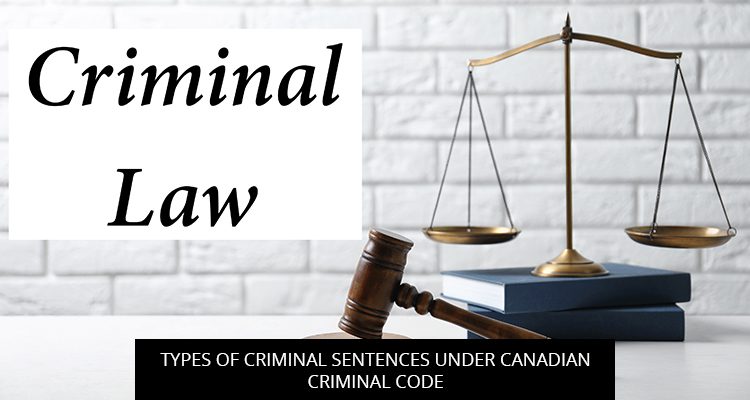
Being accused of a crime is an alarming sign. The very first thing that pops up in the mind, when you envision a crime is a prison sentence. The most ideal choice if you are accused of a crime is an acquittal or to have the charges withdrawn. Nonetheless, even if you are found guilty, there are numerous penalties that are less extreme than a prison sentence, some of which won’t bring about a permanent criminal record.
There is a wide array of sentences that a sentencing judge can award in Canada. At the same time, judicial discretion remains a functional element when it comes to compliance with sentencing guidelines. However, under section 718.1 of the Criminal Code (R.S.C., 1985, c. C-46, it is required that a sentence needs to be proportionate to the severity of the crime and the extent of responsibility of the accused. Having said that, there are some main types of sentences established by the Criminal Code of Canada.
1. Diversion
Diversion is not a finding of guilt, so it is not indeed a “sentence” in essence. The goal of this program is to divert the persons (alleged to have committed an offence) from the criminal justice framework while holding them answerable for their actions. Here, the accused takes responsibility without admitting guilt. The charges can be withdrawn by the Crown if all of the requisites of the diversion program are fulfilled. There are usually several necessities imposed upon entering a diversion program, some common terms maybe community service, a letter of apology, attendance in therapy, etc. Diversion does not bring about a criminal record.
2. Absolute Discharge
An absolute discharge registers no conviction. Under section 730 of the Criminal Code, absolute discharge can be ordered by taking into consideration the best interests of the accused if there is no mandatory minimum sentence for the crime. If the court enforces an absolute discharge, then the charge must be detached from your criminal record after 1 year. This is characteristically reserved for the most negligible and minor of crimes and is considered to be the lowest sentence an accused can be awarded with.
3. Conditional Discharge
There is a certain set of conditions or rules associated with this type of order and the accused is supposed to comply with the terms for a certain period of time through a probation order. These conditions could generally include, but are not limited to,
- working community service hours,
- keeping no contact with the victims, or
- attending particular counseling programs
Hence, one must meet the conditions in order to have the charge diminished from their record. After 3 years, the sentence of conditional discharge is swept away from your criminal record.
4. Fine
When you are accused of a crime and the judge imposes a fine as an independent sentence, there will be no jail sentence. It is pertinent to note that a fine levied as a sentence registers a criminal record. Inability to pay a fine, or not making standard payments could result in further charges of civil nature.
5. Suspended Sentence
A suspended sentence is parallel to a conditional discharge where an offender is released on probation without imposing a prison sentence. However, unlike a conditional discharge, a suspended sentence will result in a criminal conviction on your record. If the accused breaches any conditions during the probationary timeframe, then they can be expected to serve the full term that would have been apposite for the crime.
6. Conditional Sentence
A conditional sentence is generally known as “house arrest”. A Conditional sentence is a prison sentence that registers a criminal record, but you will serve the sentence in the community rather than in prison. This implies that conditional sentences are actually community based sentences where punishment is combined with rehabilitation.
Conditional sentences are generally awarded under following circumstances:
- If there is no specified minimum term of imprisonment for the offence under the law
- If the length of the sentence is two years less a day
- If the court is reasonably convinced that the offender would not pose any danger to the safety of the society.
Further, the sentence might allow time away from the home to attend work or medical appointments, but this ought to be solicited with the sentencing judge in court as it is not primarily appended to the sentence.
7. Intermittent Sentence
An intermittent sentence is a prison term served only on certain selected days. The option of an intermittent sentence is only available if the sentence is 90 days or less. Under an intermittent sentence, an accused is subject to a probation order to analyze the conduct when he or she is not imprisoned. A permanent criminal record is constituted on the imposition of this sentence. However, this program is not available at all prison facilities.
8. Custodial Sentence
A custodial sentence is essentially a prison term whereby the custody of the offender is made mandatory in prison. If the sentence is shorter than two years you will be sent to a provincial facility and if it is two years or longer, you will serve the term in a federal facility. There are certain options available for early release, yet it relies upon the individual circumstances of the offender.
Our Skilled Lawyers Can Help You
The prospect of a criminal record and a prison term may be very frightening. Your best option for understanding the possibility of an acquittal or withdrawal of charges is to hire a criminal defence lawyer. “Ayaz Mehdi Professional Corporation” is a full-service firm that can assist you with your Criminal matter.
Disclaimer: Kindly note that sending or receiving information through this site does not establish a solicitor-client relationship. Legal matters are fact-specific, and the law is variably changing. The views expressed and the content provided on this blog are general guidelines and cannot substitute for proper legal advice. Schedule your legal consultation by clicking here: Let’s meet!






